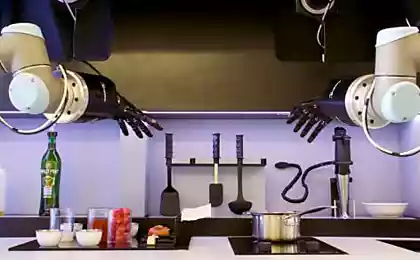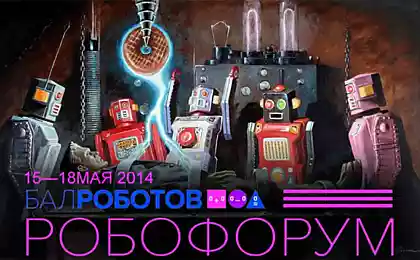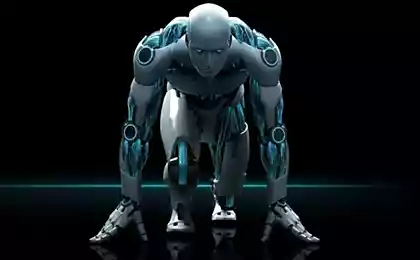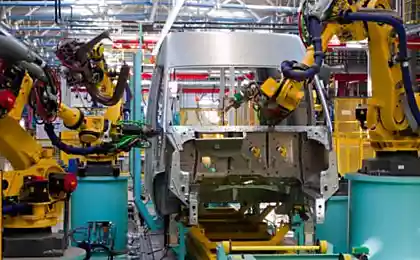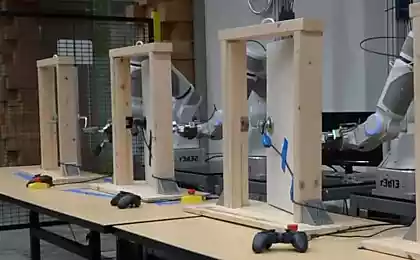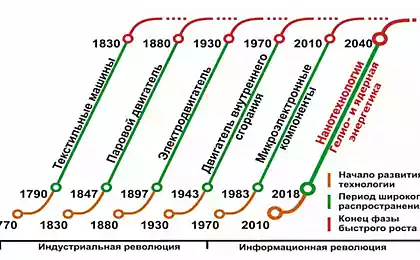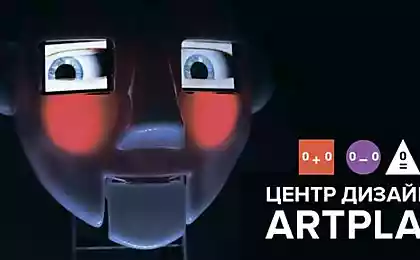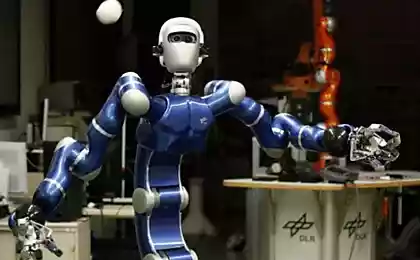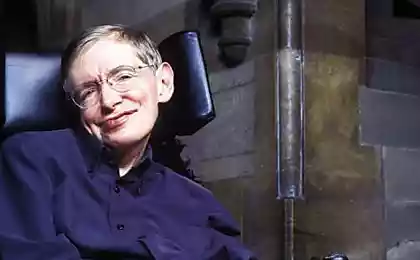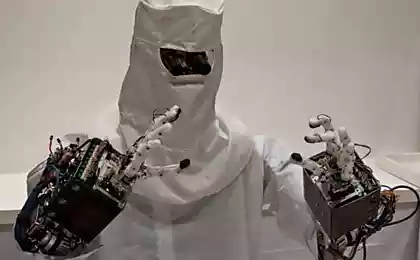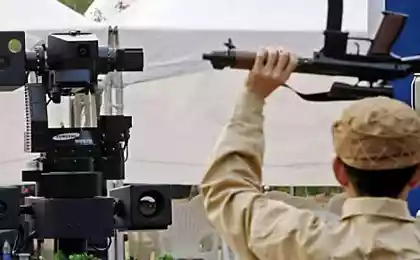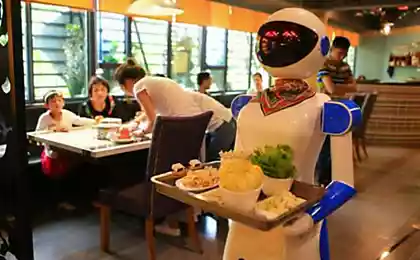1481
Will robots cause global unemployment?

Once the thought of robots firmly entered our lives, breathtaking and promised unthinkable achievements. Forgotten hassle, stopped running. We dreamed of a brave new world in which robots are faithful servants, and man enjoys the fruits of his scientific achievements.
However, in recent years, the increasing adoption of robots has forced us to rethink the sign of this phenomenon. “Robots work, not humans.” And this is the root of the emerging drama. What about the man? He doesn't work, he doesn't earn. Increasingly, there are voices that the development and cheapening of robots will soon make the labor of people in many professions unprofitable. And you can be sure that businessmen will make an unambiguous choice in favor of robots. This means that many people will have to look for a new job, retrain for other professions, a decline in the level of well-being, social tensions, an increase in crime and further on the list.
Is there really such a bleak robotic future ahead of us? Let's talk.
In the past, people had to hunt or gather for survival. But people were too lazy and smart, so they invented tools to make their work easier. The development of tools made it possible to free the vast majority of the population from direct food production: in 1790 about 90% of the population was engaged in this, in 1900 - about 35%, in 2010 - 2-3%. At the same time, we still live in food abundance, and about 30% of food produced do not reach the shelves, rot and spoil.
This is not only true for agriculture. For thousands of years, we've been creating new tools to facilitate all kinds of physical labor. Tools and machines are our mechanical muscles, stronger, more reliable and more relentless. The use of all these tools has allowed billions of people to specialize in one thing, which has become the key to economic growth and living standards. Some specialize in programming and engineering, creating artificial minds. And just as “mechanical muscles” made physical labor less in demand, so artificial intelligences made human labor less in demand. It's the work of our brains.
We are on the threshold of a new economic revolution. If you think this has happened before, you are wrong. It's different this time.
When it comes to automation, many people imagine huge, bespoke, expensive, efficient, but blind to the outside world robots designed to perform only one or more operations.
This is an outdated approach to automation. A few years ago, the Baxter robot appeared, capable of independently learning actions that it had not done before.
Unlike specialized industrial robots, which require specially trained operators, technicians and cash injections to operate, Baxter can simply observe human actions and then repeat them. And its cost is less than the average annual salary of a worker in a developed country. Baxter was one of the first general purpose robots.
Here comes a comparison with computers. At the beginning of their history, they too were large, expensive and highly specialized. But once there were compact general purpose computers, they soon became capable of doing anything. And thanks to its applicability in almost all areas of life and industries, computers continue to increase their power and become cheaper.
Now Baxter can be compared to a universal computer from the 1980s. Even though it is slow, an hour of its work is worth a penny thanks to its low energy consumption. While its biological competitors need to pay minimum wage. Even if it is 10 times slower, it will be more profitable if the cost of operating it is 100 times lower than the worker’s salary. At the same time, he is quite capable of performing many actions that do not require high qualification.
There is already an example of how far less advanced robots than Baxter can take the place of humans. Some new supermarkets in the U.S. are already using robotic cash registers.
Another illustration is that hundreds of thousands of baristas around the world are under threat. Of course, the expertly prepared coffee is not comparable to the one chosen on the screen of a coffee machine. But most people don't need gourmet delights.
A very recent example of the onset of robots and much more complex professions than making coffee: aviation. No, we are not talking about the autopilot system, but about full-fledged independent control of the aircraft, from takeoff to landing. PIBOT was recently demonstrated at the Intelligent Robots and Systems conference. This is a slightly modified very cheap robot Bioloid Premium from Robotics.
As you will see from the video below, it is able to independently, without human help, with the help of mechanical controls to take off and fly along the route in a flight simulator. The landing procedure still requires human help, but the developers say they are almost close to solving the problem of self-planting. The robot is guided by the image on the screen using a contour recognition algorithm. The authors of PIBOT say that its capabilities already meet a number of requirements prescribed in the flight manual from the Federal Aviation Administration.
Soon, the developers promise to publish a video in which the robot controls not a virtual aircraft, but a radio-controlled model.
At the dawn of the 1900s, the active development of motor vehicles began. From the point of view of the horses themselves, this was a great trend: you don’t have to languish at hard work in the fields, get exhausted when delivering mail, carry riders into battle. Today’s proponents of the ubiquitous introduction of robots argue that people freed from many occupations by mechanical assistants will gain new professions that have not even been created. But we know from horses that this is self-deception. Are there many new, unseen uses for horses in the past 100 years?
There is no economic law that new technologies create more challenges for horses. It's embarrassing to even say it out loud. But if you replace “horses” with “people,” for some reason this phrase ceases to be absurd for most people. But this is only a denial of the obvious. Just as cars made horses unnecessary, robots made humans unnecessary. Not immediately or everywhere, but on a large enough scale and pretty soon. And if we don't prepare, it's going to be a huge problem. Perhaps you now believe that your profession can not be replaced by robots. But technology is getting better, cheaper and more productive. A good example is the same cars.
Cars.
Self-driving cars have already become a reality. They are not able to navigate the roads themselves. And the question is no longer whether they will replace conventional cars, but how soon. They don’t have to drive perfectly, they just have to be better than live drivers. In the United States alone, about 40,000 people are killed in car accidents annually, in Russia about 15,000. Self-driving cars do not fall asleep on the go, do not write SMS, do not drive drunk and are not subject to bouts of driverless brainlessness. In fact, they're already better than us.
To call them “cars” is wrong. It is as if the first cars were called mechanical horses. Perhaps in the future there will be some new term, and the word “car” will be used only in relation to a man-controlled vehicle. Now imagine how many municipal and truck drivers will lose their jobs due to the introduction of self-driving cars?
There is no hope for unity and protection from the trade unions. History knows many examples when representatives of certain professions in every possible way prevented the automation of their work. But technology always won because it was more cost-effective. For example, for the same transport companies, the salary fund can reach a third of all expenses. At the same time, truck drivers must take a break every few hours for rest, which is time and money. Except for periodic accidents. And the low accident rate of self-driving cars will instantly attract insurance companies to their side.
So robotic machines are likely to be the first example of how robots are changing society. And we will be able to feel it pretty soon, within the next ten years. Elon Musk, founder of Tesla Motors and SpaceX, said that within 6 years will be able to introduce a fully autonomous electric car.
In the case of the Baxter and the Google car, one can think about how new technologies always destroy the most low-skilled professions. People have to retrain, raise their level. And we are facing a big problem of forced retraining of hundreds of millions of people who have lost their jobs. White collar workers are not safe today either. The work of many office employees around the world today can perform special programs. But software bots are much faster and cheaper than full-fledged robots. In addition, one bot can replace several employees, and the return is higher than with the automation of low-skilled jobs. This further increases the potential appeal of bots.
And here the ability to self-learning will be especially useful. Why make a very smart specialized bot for every profession when you can do a self-learning program? It will be a dark day for millions of people when they create a program that doesn’t have to teach you how to do something, but that just shows you something that’s done right, and it will figure out how to get there.
By the way, the securities market has long been dominated by specialized software. In the vast majority of cases, these are bots that have “learned” to trade on the exchange with other, also self-trained, bots. These programs don't follow people's orders, they make their own decisions about whether to sell or buy stocks.
There are already bots that write texts for the media. Mostly for newspapers. There are companies specializing in training bot journalists. For example, Automated Insights, which helps the Associated Press implement an automated service capable of generating up to 4,400 third-party earnings reports per quarter. According to the representative of AP, people-journalists during this time create only about 300 articles. At the same time, a good goal of implementing a bot service was announced - freed journalists will be able to concentrate on reporting, analytics, identifying trends and finding exclusive stories.
“Working with papers, making decisions, writing texts” – many professions fall under these definitions. And specialized bots could replace humans in most of these professions in the future. Like lawyers. For the most part, their job is to prepare documents and search for information in stacks of papers, such as strange transactions or suspicious coincidences. This is a real job for a bot. And the search for data in many firms is already entrusted to bots. They review millions of emails, notes and documents over hours, not weeks. And their advantage lies not only in speed, but also in accuracy.
Here's a much more complicated example. The IBM Watson artificial intelligence program already copes with diagnostic tasks at the level of medical students. As with self-driving cars, robots don’t have to be perfect doctors, just better than humans. And the proportion of misdiagnoses in modern medicine is still appalling. In addition, robots will never forget or confuse the use of drugs, as well as their mutual effects. Medical bots will be able to exchange experience and knowledge with each other, keep abreast of the latest research. They will be able to continually collect and analyze medical statistics about all their patients. Of course, bots can not replace all doctors, but a number of specializations – quite.
If your work is related to creativity, you probably consider yourself “invulnerable” to robots. Perhaps this is only partly true.
Many people compare the creative process to something magical, but this is not true. The brain is a very complex structure, perhaps the most complex in the universe. But that doesn't stop us from trying to model it.
And if we can do that, we will create a tool that will make our thinking abilities unnecessary. There is an opinion that by placing a boring routine on robots, humanity will be united in creativity in all its manifestations. Alas, but hundreds of millions of artists, sculptors, photographers, writers, poets, actors, directors, singers, musicians and other creative personalities are not needed by anyone. Their real number is already very small. Their income depends on popularity and demand, so the number of such people in any society is always insignificant. There is no economy based on drawing or writing.
Going back to the bots, they're already writing music. A bot named Emily Howel can generate a huge amount of content in a day. And with blind testing, few people will be able to distinguish “her” works from those written by humans. Of course, now there can be no question of full-fledged creativity of artificial intelligence. The task of creating a mechanical mind still seems impossible. However, the above example already proves that the idea of algorithms that assemble a finished “product” from some basic components is quite viable. It is possible that in the medium term there will be programs capable of creating quite tolerable pictures. The first steps in this direction have already been taken:
//player.vimeo.com/video/101281188
Although in fiction in the foreseeable future, robots are unlikely to reach any heights. Despite the successes in creating newspaper notes, for conscious and valuable from the point of view of art word folding in sentences need full-fledged intelligence, albeit artificial. At least that's what I want to hope for.
Alas, in some areas in the future we will be able to automate the creative process. Not at the level of creating masterpieces, but within the framework of popular culture – quite.
It is unlikely that the introduction of robots will be solely imposed by corporations. A recent study from the Massachusetts Institute of Technology has yielded unexpected results: working people are more likely to prefer that their immediate bosses be robots than people. As the researchers noted, the subjects under the supervision of robots worked more efficiently and expressed greater satisfaction.
It is difficult to say why people chose to obey the machine. Psychologists will better tell about the deep mechanisms, but we can assume several reasons. For example, this is a kind of rest from the need to constantly maintain social contacts. After all, we encounter tens and hundreds of people every day, and we have to communicate with them in one way or another, from crossed views on the subway to close cooperation on work issues. It is not surprising that so popular for many people the desire to go on vacation where there are as few brethren as possible. The second reason why a robot is “better” than a human is the absence of the need to establish personal relationships, try to please the boss, tolerate his unpleasant attitude towards himself. Although MIT experts believe that the reason for the higher efficiency of the “robot-human” bundle is the ability of robots to quickly produce instructions “on the fly”.
There's another reason for the potential favorability of robots. We are talking about the personification of machines, giving them the features of people or animals. Many of us treat our cars or computers not just as mechanisms, even give names to them. This trend regarding robots is confirmed by the results of a study conducted among American soldiers using military robots.
At the household level, we will also be happy to welcome robots into our lives, and we will gladly begin to shift small tasks and worries to them. Delivery of cargo, use as a day planner for the whole family and a home information portal (think of all sorts of artificial intelligences in science fiction films on spaceships, all-powerful, omniscient and voice-communicating). Robots will become familiar and convenient, and the more imperceptible to us, they will replace us in the labor market.
A little offtop. An interesting point of view on our possible robotic future was voiced by Nell Watson, engineer, futurist and CEO of Poikos. However, we are not talking about unemployment due to the fault of robots, but about the traditional horror story from the series “we will all die”. According to Watson, the development of artificial intelligence technologies can lead in the future to the creation of a sufficiently developed machine intelligence, which independently or collegially with its kind will decide on the destruction of people from other countries. mercy. Or out of pity, if you like it better. Watson proceeds from the thesis that artificial intelligence, initially functioning on the basis of a system of rules, in the future will reach the level of the human mind, knowing the world through intuition.
Let’s not go into arguments about the problems of creating artificial intelligence and scenarios a la Terminator. Watson’s proposed solution to this hypothetical problem is interesting: robots need to instill human values first. She believes that “understanding” humans by robots will prevent genocide out of pity.
Some readers will still believe that all the scenarios described above are idle fictions. Unfortunately, robots are already among us, and many new ones are being created and tested in laboratories. Humanity has already gone through various economic revolutions, but the introduction of robots is quite another. They threaten not just any particular profession, but almost any. Soon many of us will suddenly find ourselves in the shoes of horses struggling in vain to compete with cars.
In addition to unemployment, one of the possible consequences of the mass introduction of robots in various professional fields may be the gradual loss of knowledge. Having invested all the accumulated knowledge in electronic assistants, making them perfect substitutes, we will gradually begin to lose scientific personnel and practitioners. In conditions when robots will do something well for us, and people of the same profession will have to retrain, then the continuity of knowledge transfer will simply be disrupted. The development of science will be the lot of a handful of people who feel their calling.
There is no hope for the emergence of many new professions in which millions of people will be able to apply. Today, there are hundreds of professions, but the contribution of new ones to the economy is small. The vast majority of occupations, which employ about 45% of the U.S. population, have been around for centuries, and almost all of them can be automated. In comparison, during the Great Depression, the unemployment rate in the United States reached 25%. Of course, it won’t happen overnight, or even within a year or five. But this process will expand and intensify.
You probably have the impression that we are categorically against robots and automation. That's not true. We only urge not to engage in self-deception in assessing the future that will give us the mass proliferation of robots, both physical and software. We must now think about what to do with the huge masses of the population, who will lose their jobs through no fault of their own. What do we do in a future where most jobs don't require people?
Indian spacecraft Mangalyaan successfully arrived in orbit of Mars
5 features Apple Watch, and 5 that these hours are not yet available
